.
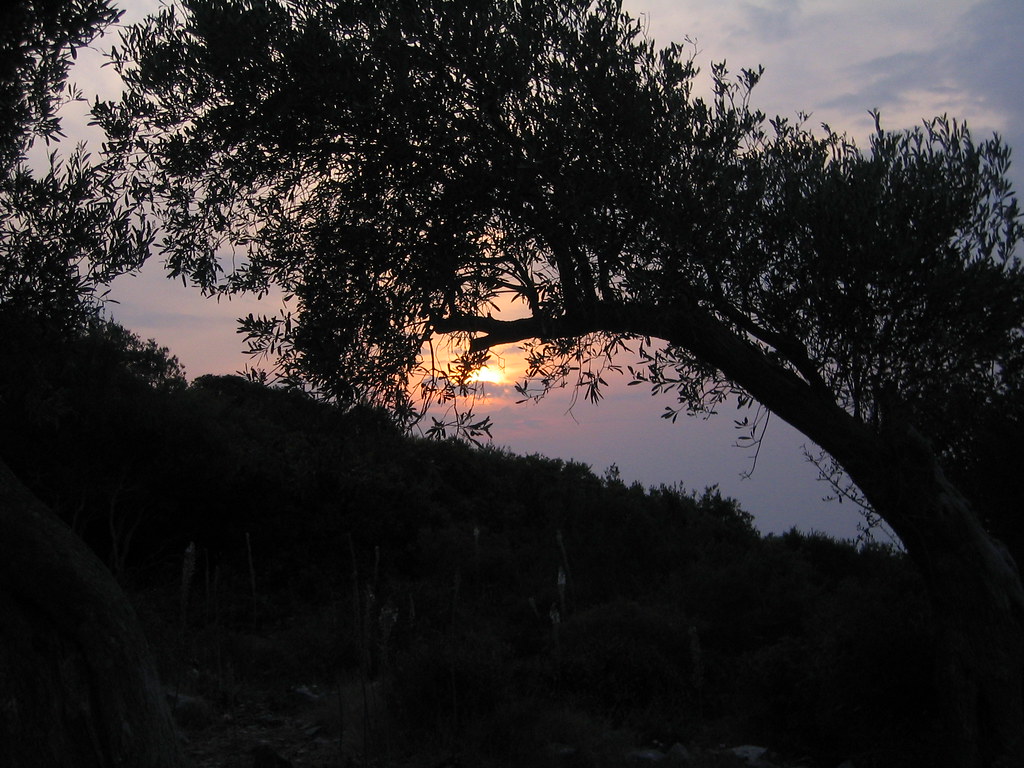
Lost in recollection
Amidst deep ancient wrinkles,
This is where one should spend
The dying minutes of each wasted day.
Amidst deep ancient wrinkles,
This is where one should spend
The dying minutes of each wasted day.
Vassilis Zambaras: Stopping by a Grove of Ancient Olive Trees Near Twilight, I Think Myself Fortunate: via Vazambam, 7 October 2015
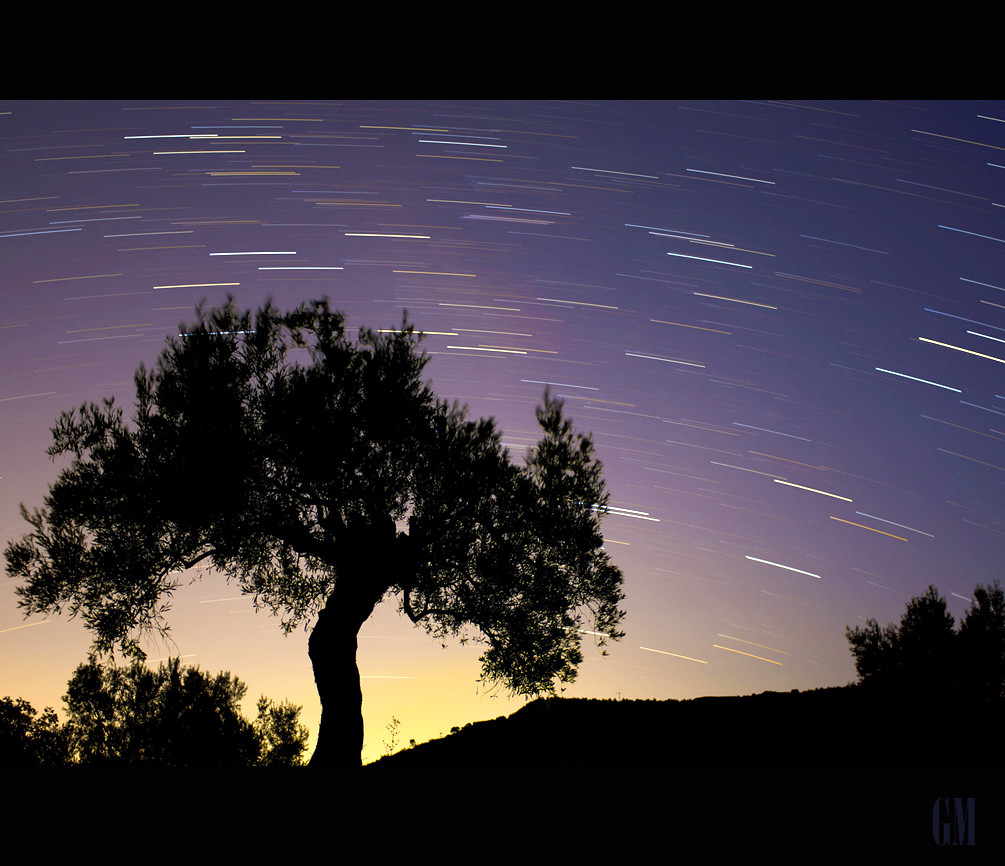
Starlight above olive trees at sunset, Attica: photo by Mgpixel, 4 September 2013

An olive tree, Bi'lin, West Bank: photo by elena martinez, 12 June 2009

Olive trees on Thassos, Greece: photo by Peter Pakandl, 7 September 2006

International volunteers assist in the olive harvest in the occupied territories: photo via Rabbi 4 Human Rights @hreng, 17 October 2015
#Zionist Occupation prevents #Palestinian farmers from picking their olives in #Burin [photo ISM]: image via Abbs Winston @AbbsWinston, 9 October 2015
Fires in #Palestinian olive groves and rock attacks by Israeli settlers injure british monitors #Burin [photo ISM]: image via Fiona Dunlop @ffdunlop, 14 October 2015
Life near the dead syria aleppo: image via baraaalhalabi, 16 October 2015

The #OliveHarvest in the OT has begun! Want to join in on the goodwill? Join us in the groves!: image via Rabbi 4 Human Rights @rhreng, 7 October 2015

The #OliveHarvest in the OT has begun! Want to join in on the goodwill? Join us in the groves!: image via Rabbi 4 Human Rights @rhreng, 7 October 2015
Show the power of solidarity and goodwill. Volunteers needed TMRW for Pal olive harvest @RavArik: image via Rabbi 4 Human Rights @rhreng, 7 October 2015

Israeli settlers burn trees and disrupt olive harvest in Burin [photo ISM]: image via Gabriel Helou @GabrielHelou, 14 October 2015

Israeli settlers burn trees and disrupt olive harvest in Burin [photo ISM]: image via Gabriel Helou @GabrielHelou, 14 October 2015
Settlers terrorize Palestinian farmers in Burin: burn trees and disrupt olive harvest
A Palestinian farmer and English human rights defender have
been hospitalized and at least 40 olive trees burnt following an attack
by illegal Israeli settlers in the northern West Bank town of Burin
today: International Solidarity Movement, Nablus team | Burin, occupied Palestine, 14 October 2015
At 10am this morning, as ISM and other international volunteers
accompanied olive farmers who have repeatedly been restricted from
accessing their fields, gun shots were heard ringing out across the
valley from the settlement above. Approximately thirty masked settlers
from the illegal Yizhar settlement then descended the hill and started
throwing stones at the group which had peacefully been picking olives
for several hours. International human rights defender David Amos, a
Quaker from London, was repeatedly attacked with rocks from three meters
away, causing two head wounds and copious bleeding. The owner of the
land, Abed Musaa, was hit in the front and back with stones and has been
treated for lacerations and bruising. The attacking settlers also
stole phones, a camera and a bag from the international human rights
defenders.
The settlers were then witnessed setting four separate fires to grass
on the edge of the olive groves which rapidly grew in dimensions,
consuming olive trees and the grasslands between family plots. Two
Israeli forces jeeps and two collaborating illegal settler vehicles
drove into the valley, took photos of the scene, and then parked
alongside each other on the road to Yizhar as more fires were lit by the
masked settlers throughout the valley.
Israeli forces then scaled the valley and were witnessed saying to
Palestinians, “yes you want peace, we want peace, they want peace,”
referring to the settlers. Burin farmer and school teacher Doha and
Samir were prohibited from continuing to pick olives on their land, being told they required a permit despite no legal provision to that effect, being within Area B zoning under the Oslo accords.
Palestinian firefighters were prohibited from accessing the fire for three hours,
being told that a permit was required to utilize the road to the Yizhar
settlement, which has been heavily restricted to Palestinian traffic in
recent weeks. Palestinian civil workers, farmers, and international
human rights defenders attempted to put out the blaze with sand,
shovels, and olive branches but were unable to stop the spread of the
fire amid 30 degree heat and rising winds.
Olives are a traditional produce of the Nablus district and constitute 25% of the West Bank’s economy (OCHA 2014).
This critical October harvest season falls amid rising tensions in the
West Bank, as Israeli forces increase their deployment of soldiers and
use of violence in the occupied territories. The Yizhar settlement has
also been implicated in the tragic death of 18 month old Ali Dawabsheh
and his parents in the Palestinian village of Duma two months ago.
Terrorist settlers attack the olive harvest in Burin: photos via ISM, 16 October 2015
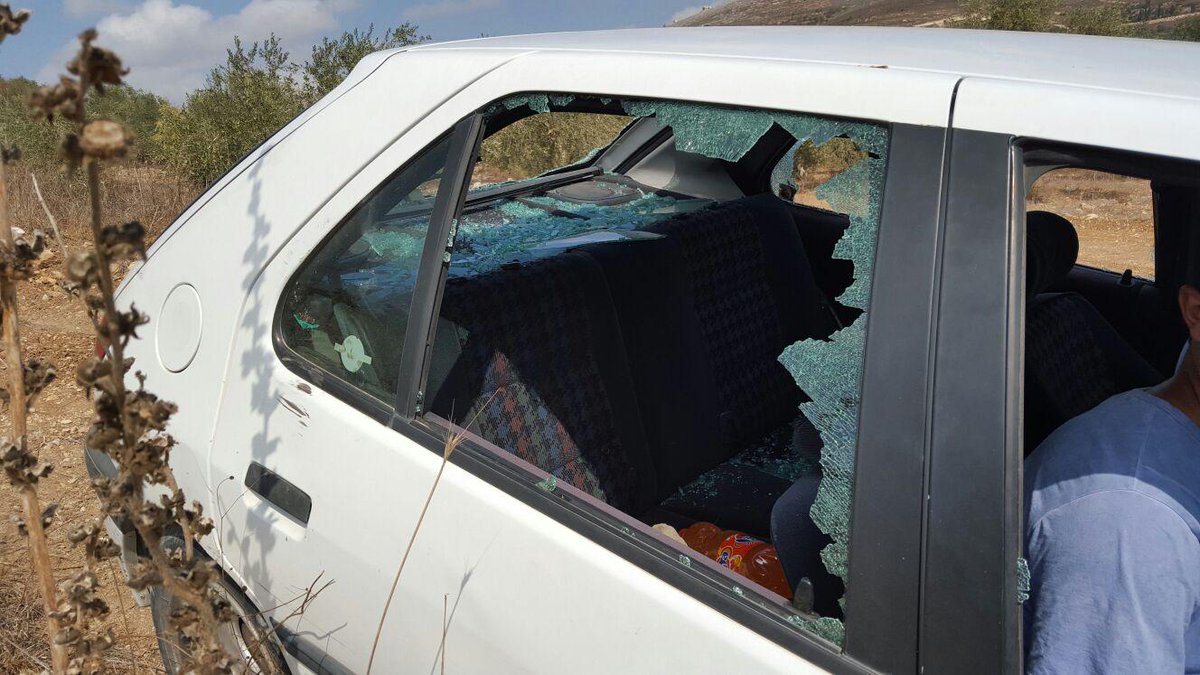
BREAKING: #Palestinians report extremists attack, injure Pal and int'l activist near #Huwara: image via Rabbi 4 Human Rights @rhreng, 14 October 2015
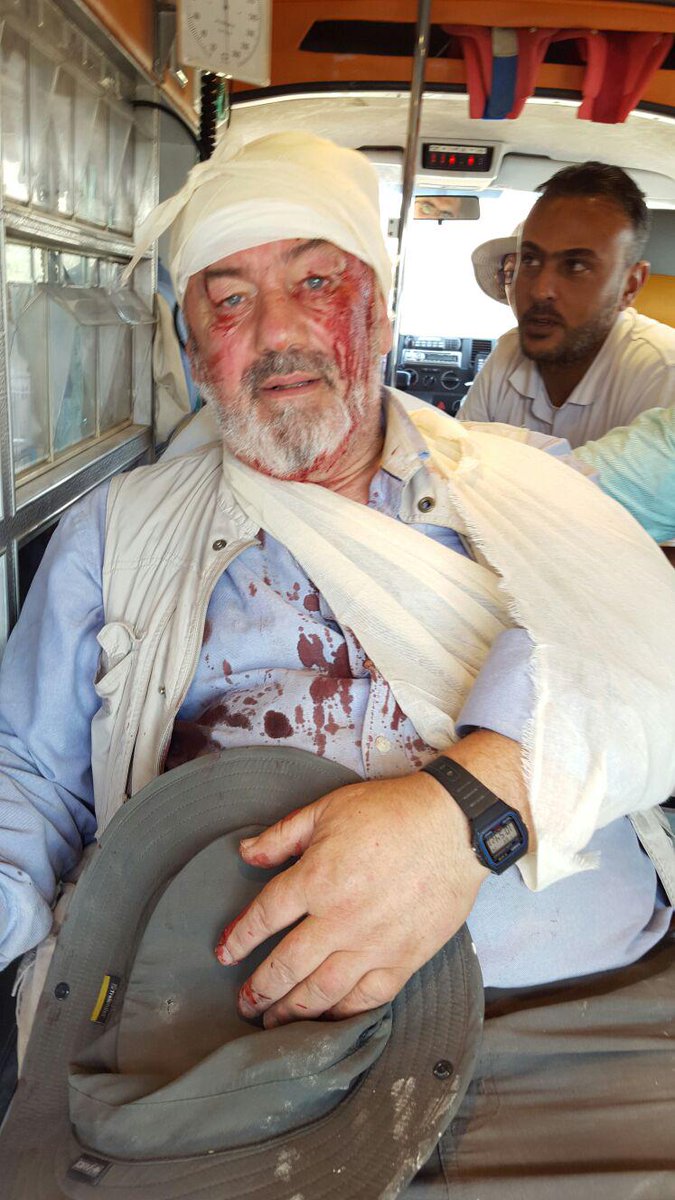
BREAKING: #Palestinians report extremists attack, injure Pal and int'l activist near #Huwara: image via Rabbi 4 Human Rights @rhreng, 14 October 2015

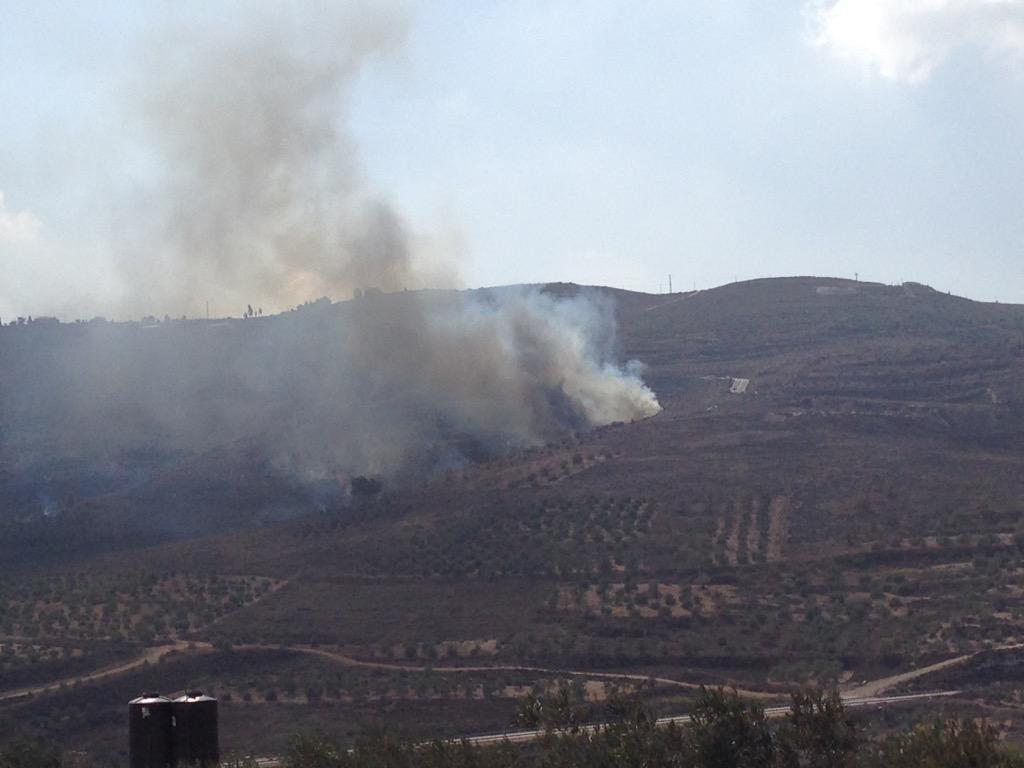











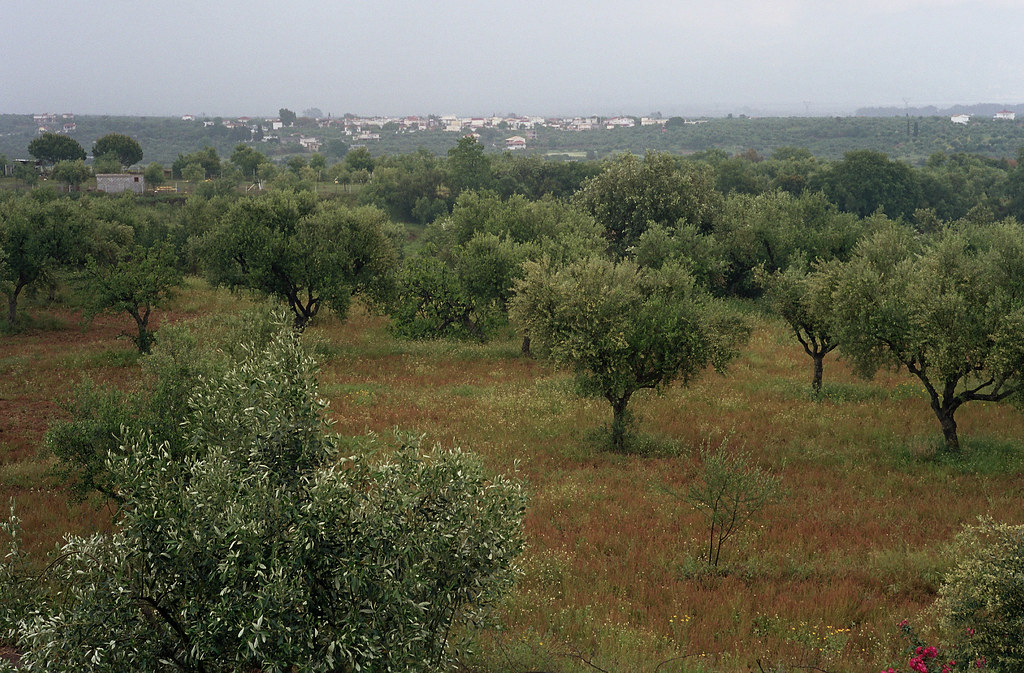
Settlers set fire to fields and vandalized olive trees in the vicinity of soldiers who did not prevent the attack (video): video via B'Tselem, 8 October 2015
ReplyDeleteShocking footage of extremists stoning Pal farmer's car. Farmer & volunteer also attacked, fields arsoned @YeshDin: video via Rabbi 4 Human Rights @rhreng, 14 October 2015
Van Gogh's inflamed paint takes on tragic force when seen alongside the images and clips. The poem's trees vessels of memory - human, historical.
ReplyDeleteI can't bear the plain thuggishness of it all. Until the settlements are gone there can be no talk of peace.
Many thanks, Duncan and Sandra.
ReplyDeleteDuncan, thanks for the word about the Van Gogh. The image of the bloodied, bewildered Quaker human rights monitor, who had come out from London to attempt to help and participate in and protect the critical olive harvest in nonviolent fashion, and ended up being stoned half to death by those destructive alien life forms -- evidently hatched just up the valley, from the same illegal dwelling complex whence had issued, a few months before, the beaming maniacal burner of the babe -- seemed to call out to the twisted agony of the paint.
Curiously, I found those video images of the violation of the harvest in some ways even more troubling than the horrifying images of the soldiers and settlers emptying their weapon clips into frail inert Palestinian children twisting on pavements (after one of three murders of children in Hebron in Friday, this one of a young boy by an armed settler, a video emerged showing soldiers on the scene planting a knife into the shadows beside the body... and shortly after that, military arrived to "detain" the observer who'd shot the video).
I mean, it's once again a good thing, for these murderers, that the "world" is, as ever, resolutely looking away.
What's hardly news, on the other hand, or I should say also, is the olive tree.
Olea europaea has coexisted with human civilization in the Mediterranean Basin as far back as the beginnings of "history" -- its oil considered sacred, its branch variously a symbol of abundance, glory, peace, wisdom, fertility, purity, power. Individual olive trees in the groves around the Mediterranean are known to live hundreds, even, as is claimed in some places, thousands of years. The tree grows wrinkled and gnarly with age. It is as old as history.
For me the twilight sadness of the mood cast by Vassilis' poem is reflected in the gnarliness of the ancient olive tree, but this dusk also secures, the familiarity of the landscape and the cultural understanding contained in a few words by a poet who is far too modest in suggesting any day on which he writes a poem might be wasted, for in his poems he never wastes a word. Ageing with grace and dignity, the gnarly elder, in this known precinct, will carry on, guardian of the grove. I don't feel it's a sad poem, but a wise one.
I was struck by the cultural distance between the respectful local knowledge shown by this poet of Meligalas in the Peloponnesus and the illegal settlers' violent desecration of the land and landscape and cultural and agricultural production of the ancient Mediterranean Basin, as represented by the events this week during the season of the olive harvest in the West Bank, to be observed in the posted video links.
No poem exists outside history. It was hard, after seeing olive groves nearing harvest destroyed, and feeling the loss of their destruction, not to see a kind of bad harvesting also in the photo from Aleppo by Baraa Al-Halabi, a great young photographer who records the current tragedy of war in another place where the cultivation of the olive tree goes very far back -- to Persia and Mesopotamia...
Baraa Al-Halabi and Vassilis Zambaras are artists from whom I take instruction, in my ancient gnarly decrepitude.